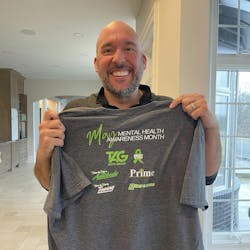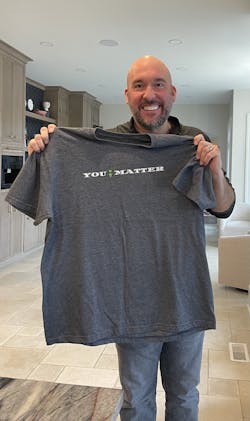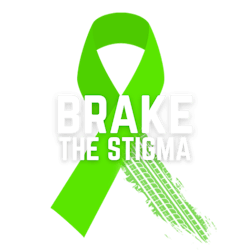When Mental Health Challenges Collide with the Workplace
People don’t just walk into their job one day and open up about their mental health struggles. Not in any work setting, and certainly not in a body shop.
That means there are a lot of people suffering in silence, experts indicate.
According to reports from the National Alliance on Mental Health (NAMI) based in Arlington, Virginia, and the Substance Abuse and Mental Health Services Administration (SAMHSA), one in five adults in the U.S. experiences some type of mental illness each year – anxiety, substance use, or depression, for instance. In addition, each year one in 20 adults experiences what’s considered a serious mental health condition, such as anxiety disorder, bipolar disorder, post-traumatic stress disorder (PTSD), or schizophrenia.
Andy Tylka, owner of TAG Auto Group in Indiana, understands these challenges firsthand. And he’s working hard to ensure that his employees have the mental health resources they need, with no shame attached.
Navigating the fog
Before joining and purchasing Tom & Ed’s Autobody and growing it into TAG Auto Group, Tylka faced personal challenges, struggling with undiagnosed ADHD, depression, and bipolar disorder. Like many, he turned to drugs and alcohol as a way to self-medicate, not realizing at the time that he was battling underlying mental health conditions. Seeking help and getting a diagnosis became his turning point, allowing him to take control of his life and eventually grow into the leader he is today.
TAG Auto Group has grown from three locations originally to 14 collision centers under his ownership, in addition to calibration, towing, and mechanical businesses that fall under its umbrella.
“I’ve been through so many depressive episodes,” Tylka says. “Identifying [a mental illness] is way better than just saying, ‘I’m messed up.’ It gives you a reason for why you are the way you are, and that is so important.”
In an effort to give his employees the gift of recovery and stability that he has experienced, Tylka got creative with TAG Auto Group’s healthcare program – adding free mental health counseling for every employee and their family members.
Normalizing the subject of mental health is crucial to overcoming people’s challenges, Tylka believes. “Today, I have 200 employees and I enjoy going to each shop during our health insurance renewal and telling employees about our program. [And] I’m very transparent about my personal struggles.”
He adds, “I own my mental health. I talk about it. I’ve gotten past the whole thing of people judging me. If an employee is struggling, it’s so much better [to talk about it] than bottling up and thinking nobody should know.”
Upping the ante in his quest to strengthen mental health, at TAG Auto Group’s 40th anniversary gala in 2023, Tylka and team used the celebration as a platform to announce the creation of a new industrywide nonprofit called Brake the Stigma.
What is Brake the Stigma?
Brake the Stigma’s mission is literally to put the brakes on the stigma surrounding mental health – specifically in the automotive industry. Accordingly, the program works to raise awareness and educate employers on how important it is to prioritize their employees’ mental well-being.
At brakethestigma.com, shop owners can find resources such as training programs, workshops, and other tools—for themselves and their employees.
What kind of fit is Brake the Stigma with the collision repair industry, which is historically male-dominated and perhaps a bit macho?
It’s a tight fit, actually.
First off, according to a 2024 National Institute for Occupational Safety and Health (NIOSH) report entitled “Supporting Mental Health in the Workplace,” work in any industry plays a significant role in people’s mental health. And managers at work can have an especially substantial impact.
The report notes, “The U.S. Surgeon General … emphasizes the role of workplaces in shaping our mental and physical well-being, noting that the average full-time U.S. worker spends about half of their waking life at work. Employment arrangements, wages, and working conditions are powerful social determinants of health, including our mental health.”
The bottom line: workers’ mental health worsens under chronic exposure to occupational stress. And according to Brake the Stigma’s website, the automotive industry is rife with this occupational stress – so much so that it’s ranked near the top of industries with high suicide rates.
Resources available through Brake the Stigma help shop managers initiate productive conversations that can help stressed-out, unwell employees move through their challenges.
As Tylka puts it, “[Shop] managers might tend to see someone struggling and think, ‘That person is angry,’ or ‘That person is lazy,’ instead of thinking, ‘What can I do to help?’”
He continues, “People don’t open up until someone opens up to them. How many people that struggle have a person come up to them and say, ‘How’s your life going? Let’s sit down and talk’?”
These are exactly the kinds of conversations that Tylka hopes Brake the Stigma can initiate.
A life-saving, trickle-down effect
For this article for Mental Health Awareness Month in May, FenderBender asked Tylka to reach out to body shops and dealerships that are using the education, training, and tools that Brake the Stigma provides, and to report back on the results. Tylka did so, and notes, “This was the first time I’d personally reached out and asked, and I got four success stories. Two were about techs who were about to quit because of the pressure of the job and other home-related things. One was a 15-year veteran.”
The manager of the 15-year-tenure employee had HR reach out and give the employee a phone number for counseling, which the employee used. “This person then wrote an employee review [about how much the counseling helped], and they posted it online,” Tylka says.
Any time body shop employees like this one are helped, he notes, it serves to normalize conversations around mental health, one family at a time.
Tylka believes so deeply in the importance of the mental health mission, that TAG Auto Group offers its free mental healthcare to not only employees on the company health plan, but to every single employee across the board and to every person within their household. “I feel like I have 200 families we’re responsible for, not just 200 employees,” Tylka explains.
“We’re working to take away the reasons why people can’t seek mental health therapy,” he adds. “So we give them the resources for in-person, online, and group therapy. The hardest thing is getting people to use those resources for the very first time.”
Through TAG Auto Group’s free mental healthcare, Tylka reports that 150 people — including employees, adult family members, and children — are now taking advantage of counseling.
“It normalizes therapy for kids,” Tylka adds – kids who then grow up unafraid to seek therapy for themselves or their families if it’s needed.
Tylka’s own 15-year-old son, Max, recently announced that he wants to go into the mental health field when he grows up. The kicker for his dad is this: he wants to specialize in helping kids.
“It’s because he struggled, as well, and he has such a story to tell,” Tylka says. “My wife and I are so proud of him – he’ll be a perfect fit for it.”
Then he circles back, big-picture: “Brake the Stigma has a long road ahead of it. Those who are interested can donate at brakethestigma.com.”
Hear more from Andy about his mental health journey in the CollisionCast interview
Mental Health Strategies for Businesses
According to Brake the Stigma's website, a healthy workplace equals a more productive, engaged workforce, and it offers these suggestions.
When employees feel supported:
- Productivity increases: Less burnout, better focus.
- Retention improves: Lower turnover, fewer absences.
- Team morale strengthens: Positive culture = better customer service.
How to reduce stress in the workplace
- Allow flexible break times when possible.
- Recognize employees’ efforts and contributions.
- Create a designated quiet space for short breaks.
- Offer mental health training for managers.
Encourage open conversations
- Use non-judgmental language when discussing stress & burnout.
- Lead by example: share your own struggles & coping strategies.
- Check in on employees regularly. A simple "How are you?" can go a long way.
About the Author

Carol Badaracco Padgett
Carol Badaracco Padgett is an Atlanta-based writer and FenderBender freelance contributor who covers the automotive industry, film and television, architectural design, and other topics for media outlets nationwide. A FOLIO: Eddie Award-winning editor, writer, and copywriter, she is a graduate of the University of Missouri School of Journalism and holds a Master of Arts in communication from Mizzou’s College of Arts & Science.



